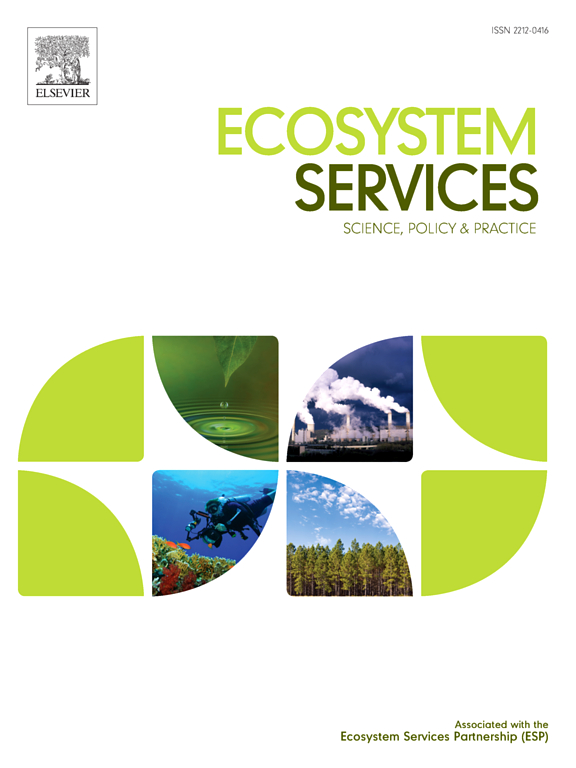Uncertainties in ecosystem services assessments and their implications for decision support – A semi-systematic literature review
IF 6.6
2区 环境科学与生态学
Q1 ECOLOGY
引用次数: 0
Abstract
Ecosystem services (ES) assessments are rarely integrated into decision-making processes, with uncertainties often cited as a major barrier. While various uncertainties, such as modelling and data uncertainties, are inherent in ES assessments, their role in uptake of ES assessment results in decision-making remains unclear. We conducted a semi-systematic literature review of scientific papers assessing ES to reveal how uncertainties in ES assessments relate to ES uptake, i.e., the potential use of ES assessment results by decision makers. We performed logistic regressions to analyse the influence of three main sources of uncertainty on ES uptake, i.e., (i) modelling uncertainties, (ii) uncertainties related to qualitative and quantitative descriptions of scenarios, and (iii) uncertainties related to the transfer of ES assessment results into decision-making. Furthermore, we investigated if stakeholder involvement plays a role in ES uptake. First, and most importantly, the results indicate that clarifying the policy context can decrease decision uncertainty and thus improve ES uptake. Referring to a specific policy, following a decisive study purpose and documenting the intended policy entry point are factors that significantly enhance ES uptake. Second, the way how ES are modelled is related to ES uptake. Our results show that using multiple models to assess ES significantly promotes ES uptake. Third, involving stakeholders in ES assessments is significantly associated with increased documented uptake. We discuss that explicitly anchoring the assessment in a policy context increases the salience and timeliness of an ES study, assessing model uncertainties can lead to more credible results, and involving stakeholders can provide more legitimacy, which together increase the potential for ES assessments and their results to be used in decision-making. This study encourages future ES assessments to integrate uncertainties in order to support informed decision-making and promote the conservation and sustainable management of ecosystems and their services.
生态系统服务评估中的不确定性及其对决策支持的影响——半系统文献综述
生态系统服务(ES)评估很少被纳入决策过程,不确定性往往被认为是一个主要障碍。虽然各种不确定性,如建模和数据的不确定性是生态系统评估固有的,但它们在决策中吸收生态系统评估结果方面的作用仍不清楚。我们对评估生态系统的科学论文进行了半系统的文献综述,以揭示生态系统评估中的不确定性与生态系统吸收的关系,即决策者对生态系统评估结果的潜在使用。我们运用逻辑回归分析了三个主要不确定性来源对生态系统吸收的影响,即:(i)建模的不确定性,(ii)与情景定性和定量描述相关的不确定性,以及(iii)与将生态系统评估结果转化为决策相关的不确定性。此外,我们调查了利益相关者参与是否在ES吸收中发挥作用。首先,最重要的是,结果表明,澄清政策背景可以减少决策不确定性,从而提高ES的吸收。参考特定的政策,遵循决定性的研究目的和记录预期的政策切入点是显著提高ES吸收的因素。其次,对ES进行建模的方式与ES的吸收有关。我们的研究结果表明,使用多种模型来评估ES可以显著促进ES的吸收。第三,让利益相关者参与ES评估与增加记录的吸收显著相关。我们讨论了明确地将评估锚定在政策背景下可以增加ES研究的突出性和及时性,评估模型不确定性可以导致更可信的结果,参与利益相关者可以提供更多的合法性,这些共同增加了ES评估及其结果用于决策的潜力。本研究鼓励未来的生态系统评估纳入不确定性,以支持知情决策,促进生态系统及其服务的保护和可持续管理。
本文章由计算机程序翻译,如有差异,请以英文原文为准。
求助全文
约1分钟内获得全文
求助全文
来源期刊

Ecosystem Services
ECOLOGYENVIRONMENTAL SCIENCES&-ENVIRONMENTAL SCIENCES
CiteScore
14.90
自引率
7.90%
发文量
109
期刊介绍:
Ecosystem Services is an international, interdisciplinary journal that is associated with the Ecosystem Services Partnership (ESP). The journal is dedicated to exploring the science, policy, and practice related to ecosystem services, which are the various ways in which ecosystems contribute to human well-being, both directly and indirectly.
Ecosystem Services contributes to the broader goal of ensuring that the benefits of ecosystems are recognized, valued, and sustainably managed for the well-being of current and future generations. The journal serves as a platform for scholars, practitioners, policymakers, and other stakeholders to share their findings and insights, fostering collaboration and innovation in the field of ecosystem services.
 求助内容:
求助内容: 应助结果提醒方式:
应助结果提醒方式:


